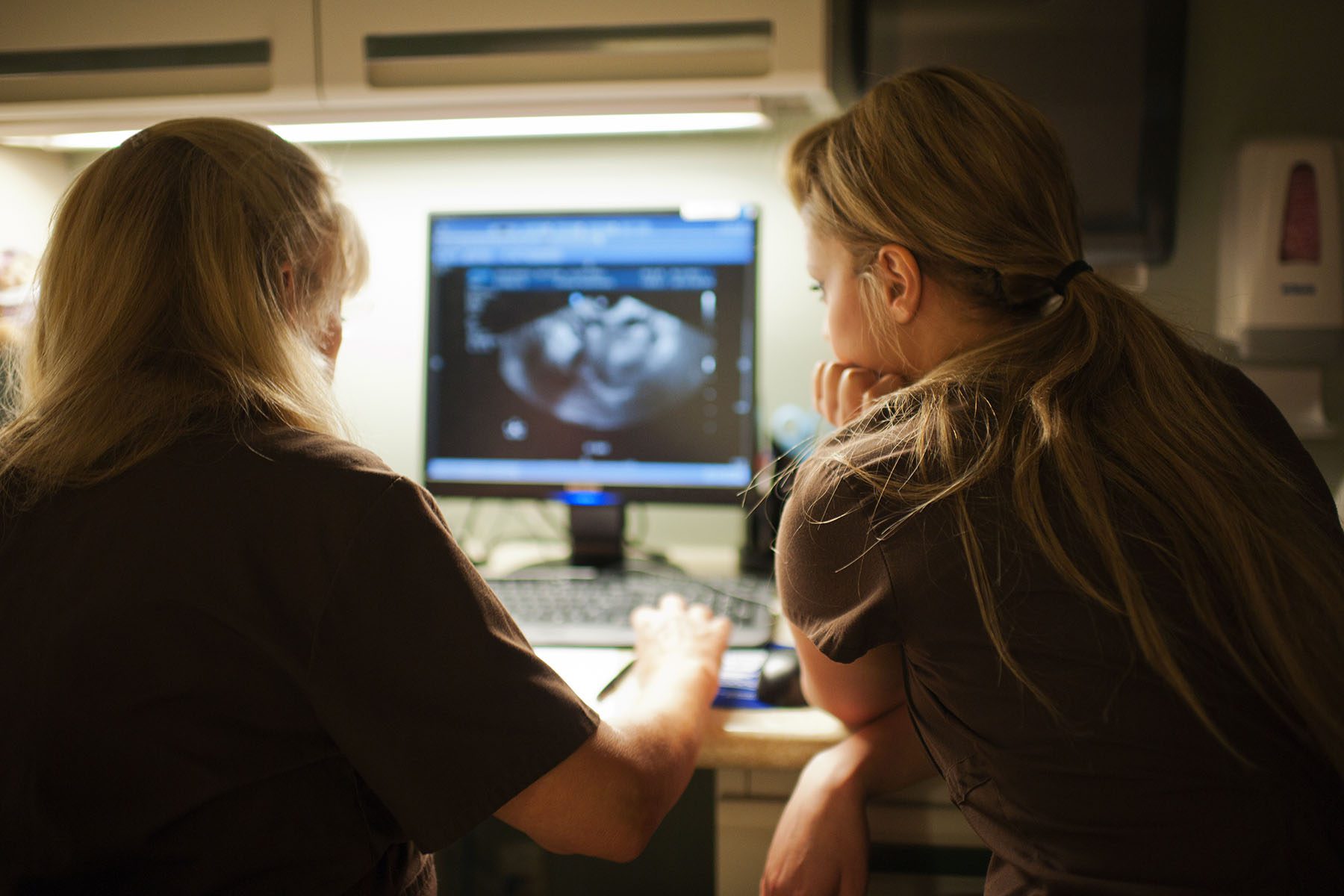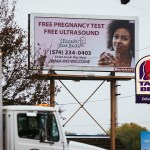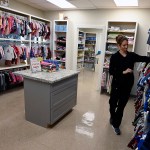The passage of Senate Bill 8 in Texas made abortion access near impossible throughout the state, leaving people with fewer options on where to begin looking when they find out they have an unplanned pregnancy; the new law bans all abortion after the detection of cardiac activity on an ultrasound, or approximately at six weeks gestational age. It has also made the demand for diagnostic ultrasounds for pregnant people in the state higher than ever.
Because of simple supply and demand, in many parts of the state, the situation has further elevated the prominence of crisis pregnancy centers (CPCs). But while CPCs provide some testing, conduct basic ultrasounds and offer supplies including diapers, they do not provide abortion care. They exist, primarily, to counsel pregnant people away from abortion.
CPCs range from independent mom-and-pop operations to facilities that operate as part of large national chains, but one thing that is constant is their counseling for any option but abortion. Even though they often, through their marketing and physical setup, are made to resemble health clinics, they are not licensed health care facilities and are not required to meet the staffing requirements or legal authorizations needed to provide the kinds of medical-adjacent services they often provide, like urine-based pregnancy testing and non-diagnostic ultrasounds. Some crisis pregnancy centers — sometimes called pregnancy resource centers — will in fact offer fewer medical services to ensure they can avoid the need for more rigorous governmental regulation.
At a time when more people may be looking for ultrasounds to date their pregnancies to know if they still qualify for abortion care, they may increasingly find themselves at a CPC, which outnumber abortion clinics and may use ultrasounds as a tool to further deter people from abortion.
Kathy Kleinfeld, an administrator at Houston Women’s Reproductive Services in Texas, said her clinic recently saw a pregnant patient who said search engine results had guided her first to a CPC. Kleinfield said the patient came in with her mom and brought the ultrasound image she had received just days before at the CPC, taking it out of her purse to show her mom and the ultrasound technician. The image was dated as being at 10 weeks gestational age.
Her ultrasound at Houston Women’s Reproductive Services showed her to be 20 weeks pregnant.
“Clearly whoever was interpreting the ultrasound had no clue what they were doing,” Kleinfeld said. “Her mother even looked at the picture — she was so upset — and said, ‘I don’t even know how to read an ultrasound and I know that’s not a 10-week pregnancy.’”
Shireen Shakouri, the deputy director of ReproAction, a progressive reproductive justice research and activism organization, criticized the way the organizations present themselves as a place to go for services that are so crucial in pregnancy care.
“There is no other sector of health care in which it’s acceptable for clinicians to deliberately mislead patients,” she said.
She continued: “It’s easy to see a violation of medical ethics at play when licensed clinicians impose their abortion stigma and misguided interpretations of religion on clients at fake clinics. So of course, we see many fake clinics getting around that by pretending to be real health care providers, just throwing on a white coat to signal medical authority and hoping people won’t ask questions.”
Some CPCs do employ licensed medical professionals, and others serve as volunteers, according to a report by the Charlotte Lozier Institute, a think tank affiliated with the anti-abortion Susan B. Anthony List that “identif[ies]policies and practices that will protect life and serve both women’s health and family well-being.” The organization said in a report released Monday that medical professionals make up 27 percent of CPC staff members in Texas and 11 percent of volunteers. The institute was unable to provide someone for an interview with The 19th for further comment.
But who is doing the procedures and with what kind of training is critical. In a state where someone often has only days to make a decision on whether to have an abortion, the stakes around ultrasound dating are high.
“These places are pushing the allure of a free ultrasound, and people forget that it’s not a medically accurate ultrasound,” Kleinfeld said.
She said she sees CPCs targeting search terms for ads through Google like “ultrasound” that pregnant people may be searching for, knowing how small the window for abortion is in Texas. As a result, Kleinfeld said that “what we are seeing is women who are being told, ‘You are too far along — there’s this new law and you can’t have an abortion now.” Sometimes these patients are in fact past Texas’ six-week cut-off, she said. But sometimes they are still in the window to access care — or, they would have been had they been seen at an abortion care provider first.
Because of this initial visit, these patients have now “wasted a whole day and then they call us and we say, ‘If you had come in a day sooner we could have taken care of you.’ Their precious clock is ticking and the CPCs have wasted a whole day.”
Efforts to reach three major CPCs in Texas for comment were unsuccessful.
On their website, Women’s Pregnancy Center — a CPC in Houston — describes its services as such: “Think you might be pregnant? Call and see if you can come in for a free lab quality test and find out today. Your appointment includes meeting with a trained and experienced consultant who will explore your options with you. Feel free to discuss your confidential situation with our volunteers.” In the next paragraph, they note, “We are not a medical facility and never profit from your decisions.”
They also outline that if a pregnancy is confirmed at their center or an outside medical facility, their “trained medical professionals provide cost-free limited ultrasound for those clients between 7 and 17 weeks of pregnancy who are not already under a doctor’s care.” This “limited” ultrasound, they say, can be used to estimate due dates and give pregnant people information about fetal development needed for their own decision-making.

Stories like that of the patient Kleinfeld saw in Houston are not outliers. A new study conducted by the Alliance: State Advocates for Women’s Rights and Gender Equality — a collaboration between Gender Justice, Legal Voice, the Southwest Women’s Law Center, and the Women’s Law Project — analysed CPC services and practices in Alaska, California, Idaho, Minnesota, Montana, New Mexico, Oregon, Pennsylvania and Washington state between March 2020 and February 2021. Their look at 607 CPCs in these nine states found that while nationally, CPCs outnumber abortion clinics by an average of 3 to 1 — with even higher disparities in states that direct taxpayer dollars to fund CPCs, like Texas does — they overwhelmingly provide virtually no actual medical care.
One of the key finds from the Alliance’s study was the prevalence of non-diagnostic ultrasounds. Fifty-six percent of the CPCs studied by the Alliance offered “non-diagnostic” ultrasounds, a procedure that cannot measure the placenta or amniotic fluid, nor be used to detect fetal abnormality or fetal distress. The anti-abortion National Institute of Family and Life Advocates (NIFLA) emphasizes on its website the power of ultrasound as a tool for dissuading pregnant people from choosing abortion and says it is essential to offer this service in CPCs. (NIFLA was the plaintiff in a 2018 Supreme Court case regarding a California law that would have required non-medically licensed CPCs to disclose their lack of medical licensure in their advertisements; the court ultimately ruled to overturn the law.) Likewise, Heartbeat International, a large network of CPCs, discusses the question of diagnostic versus non-diagnostic ultrasound in advising its centers on how to ensure they are not operating as medical centers and thus in need of complying with state regulations.
The Charlotte Lozier Institute estimated in its report that “pro-life pregnancy centers provided nearly $33 million in total services, materials and support at virtually no cost to Texas women and families in 2019.” That category includes baby goods like diapers and carseats and testing for pregnancy and sexually transmitted infections. It also includes classes focused on abstinence and referrals to social-service organizations.
In light of SB 8, the group sees this as a testament to not only its ability to help reach underserved pregnant people, but the extent of its reach in doing so. The report specifically calls out “62,233 free ultrasounds performed by registered nurses/medical sonographers.”
Kleinfeld is concerned. It feels like overnight, the web searches she regularly ran related to “ultrasound” and “pregnancy test” and other search terms related to how to date an unplanned pregnancy seemed to be directing people to crisis pregnancy centers (CPCs) rather than places that provide direct medical care. She checked in with the staffer who manages the clinic’s own Google AdWords campaign, who said they were noticing the same trend: The search terms that used to direct people to them were now pointing people towards CPCs.
That shift, Kleinfeld said, happened between August 31 and September 1 — or, immediately after SB 8 went into effect. In Texas, there are 203 CPCs to just 19 abortion clinics.
While a 2019 shift in policy regarding Google AdWords made it so that people could not buy ads using the search term “abortion” if they did not provide abortion care, CPCs can still freely buy ads off other terms that are often used by those seeking out abortion services, such as “free pregnancy test,” “pregnancy symptoms” and “ultrasound.”
Making the situation more complex is that CPCs are eligible for state funding; CPCs in Texas received an additional $20 million in state taxpayer dollars in 2020 alone through Texas’ “Alternatives to Abortion” program, after an increase in funding to $100 million in 2019, then a twentyfold increase in CPC state funding since 2006.
Per The Alliance’s report, the three most common CPC services were pregnancy tests (88.5 percent), material goods (88.1 percent), and “counseling” (78.6 percent). Just over a quarter of the CPCs surveyed provided STI testing, but most of these CPCs neither provided treatment for nor referred out for STI treatment. None offered barrier-method contraception, and only one of the 607 CPCs offered contraception of any kind. Ninety-five percent of the CPCs in the study did not offer any form of prenatal care, and less than half offered referrals for prenatal care.
The Alliance study found that baby supplies like bottles, formula, baby clothes and gear often came without cost, but had conditions: The majority of CPCs required a pregnant person to participate in and complete a series of courses ranging in everything from abstinence-only sex education to Bible studies to access these promised goods.
None of the CPC sites, Kleinfeld said, that came up in her Google search on September 1 mentioned anywhere on them that they don’t provide or refer out for abortion care or that they have an explicitly anti-abortion mission.
Alisa Von Hagel is a professor of political science at the University of Wisconsin-Superior who researches and writes on the evolution of anti-abortion culture in the United States. She told The 19th that when it comes to the impact SB 8 is going to have on the presence of CPCs in Texas and the surrounding region, she thinks that not only will these organizations have a new wave of incoming volunteers to staff their centers — since many are staffed solely by volunteers, and not paid professionals — but that more than anything, CPCs will come to dominate the landscape when it comes to being information clearing houses when it comes to where people can access information about abortion and its current legal standing.
“With [SB 8] going back and forth in the courts, I think there are a lot of questions. Clinics were inundated with panicked and frantic phone calls asking what this all means — and now CPCs are the predominant organizations in the space. We know they have also been inundated with calls for information and referrals,” Von Hagel said.
As a result, she said, even more government funding may go to these kinds of organizations “because there is this perceived need because many of these women now have nowhere else to turn, no other options or opportunities save for driving 500 miles to another state and waiting for God knows how long to access an appointment there.”







